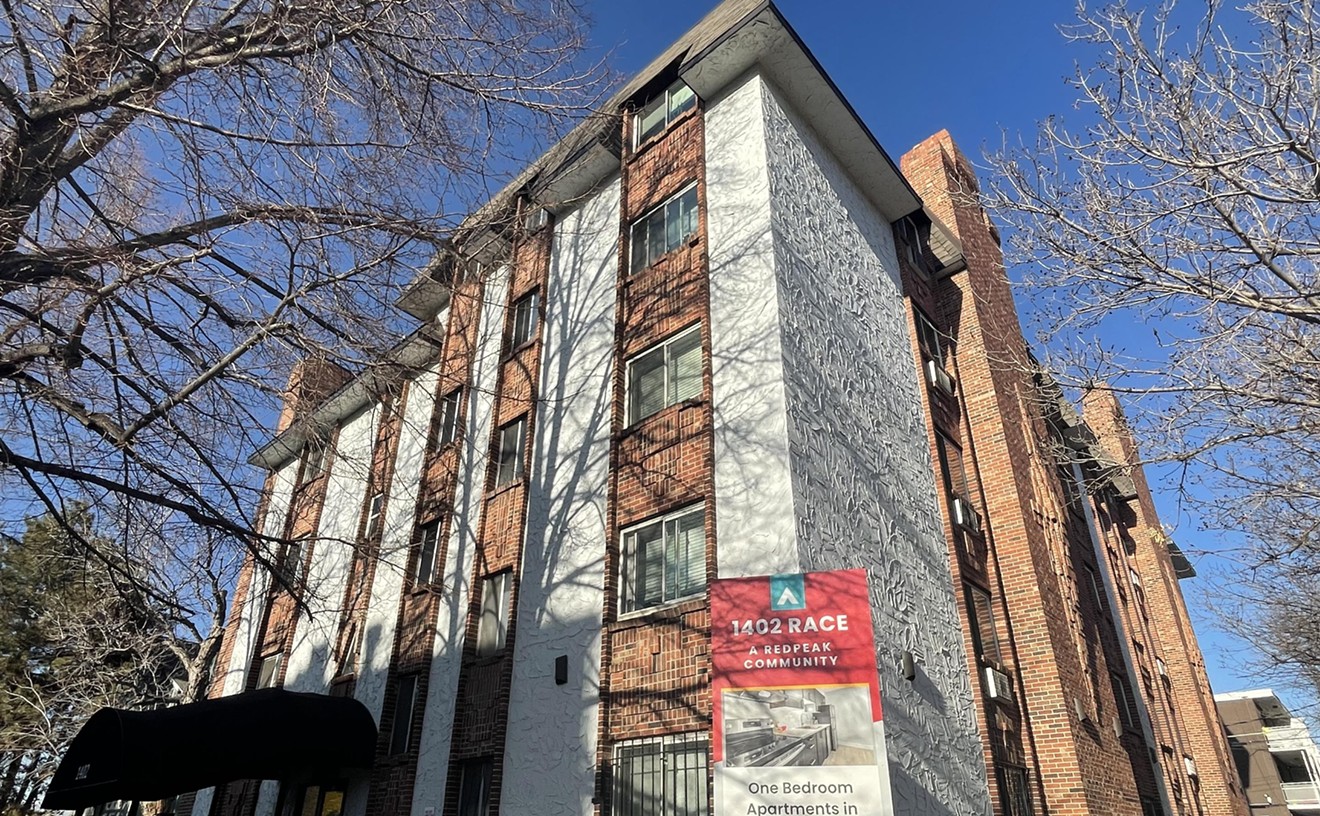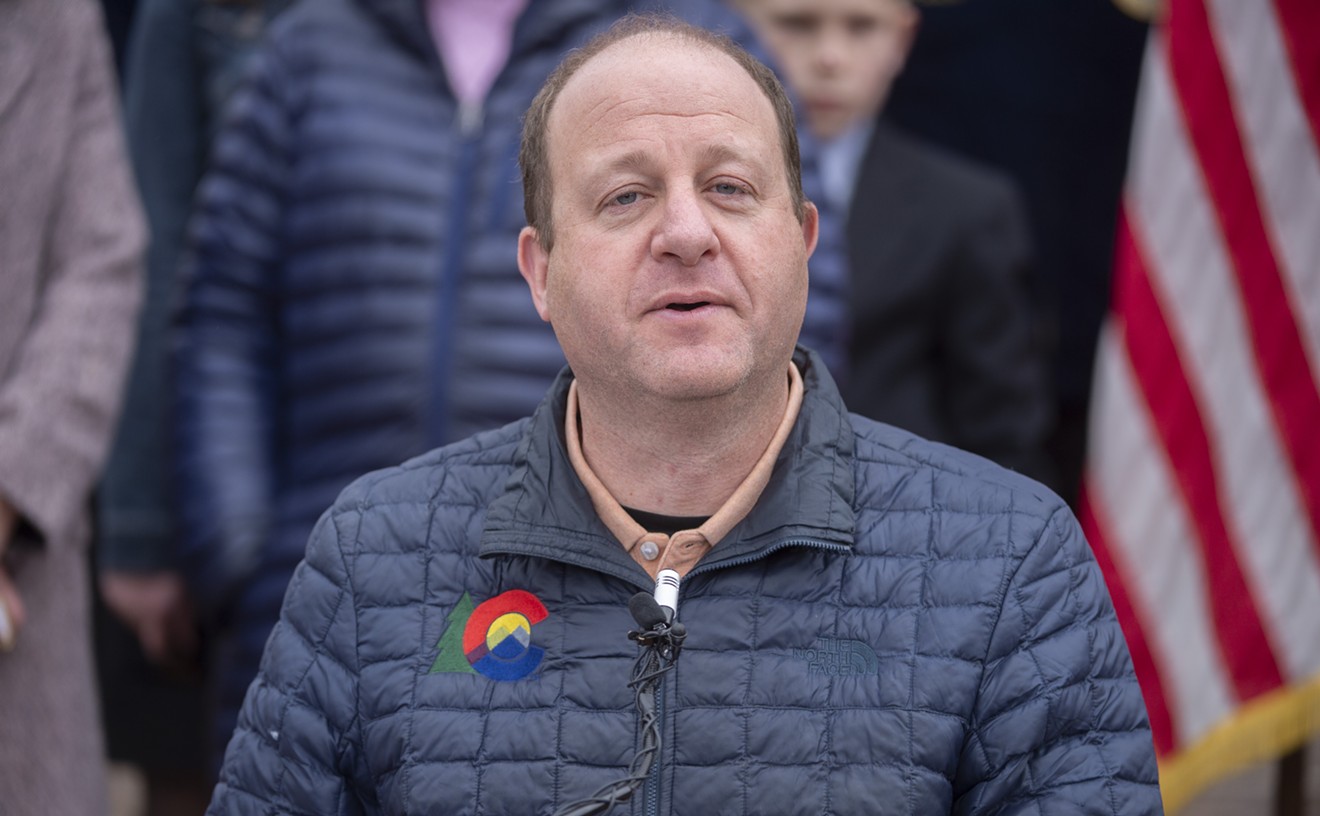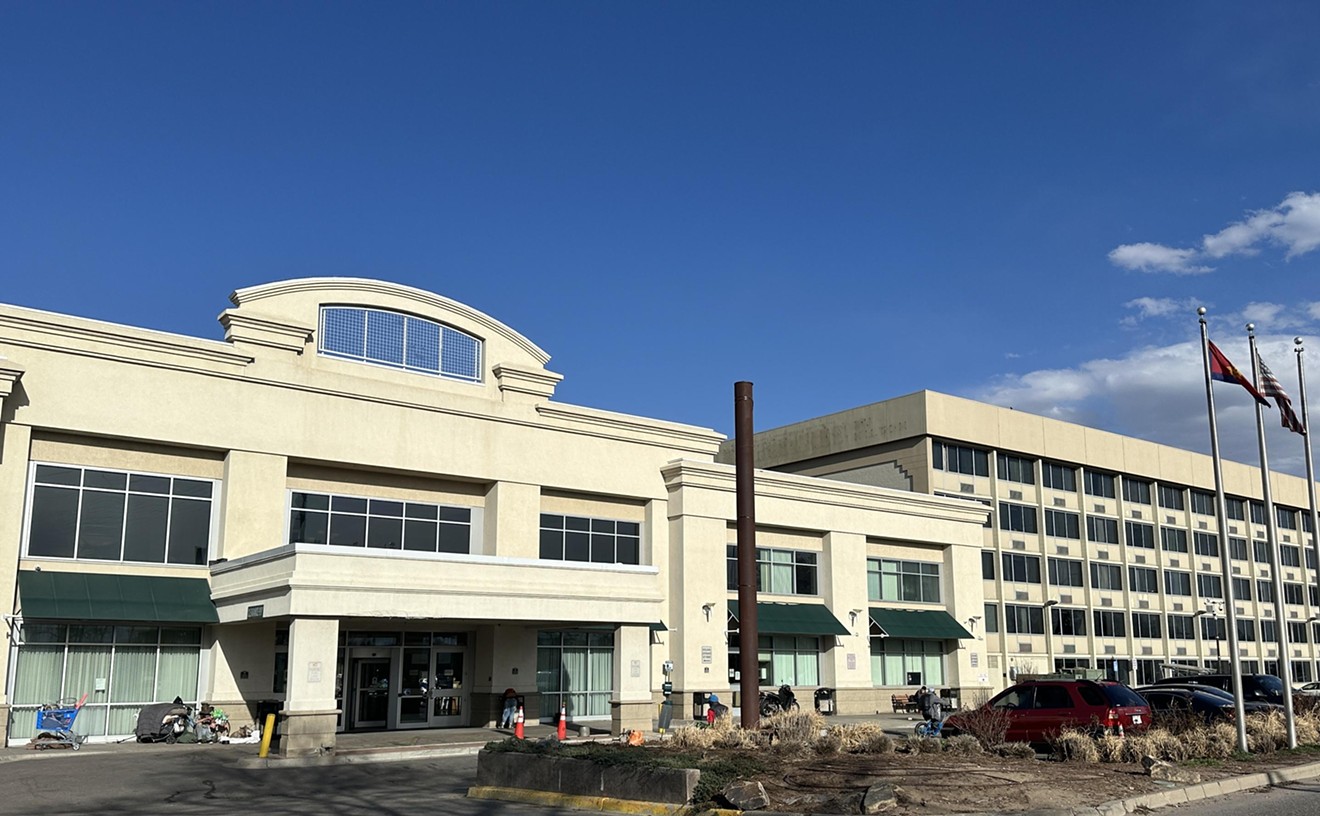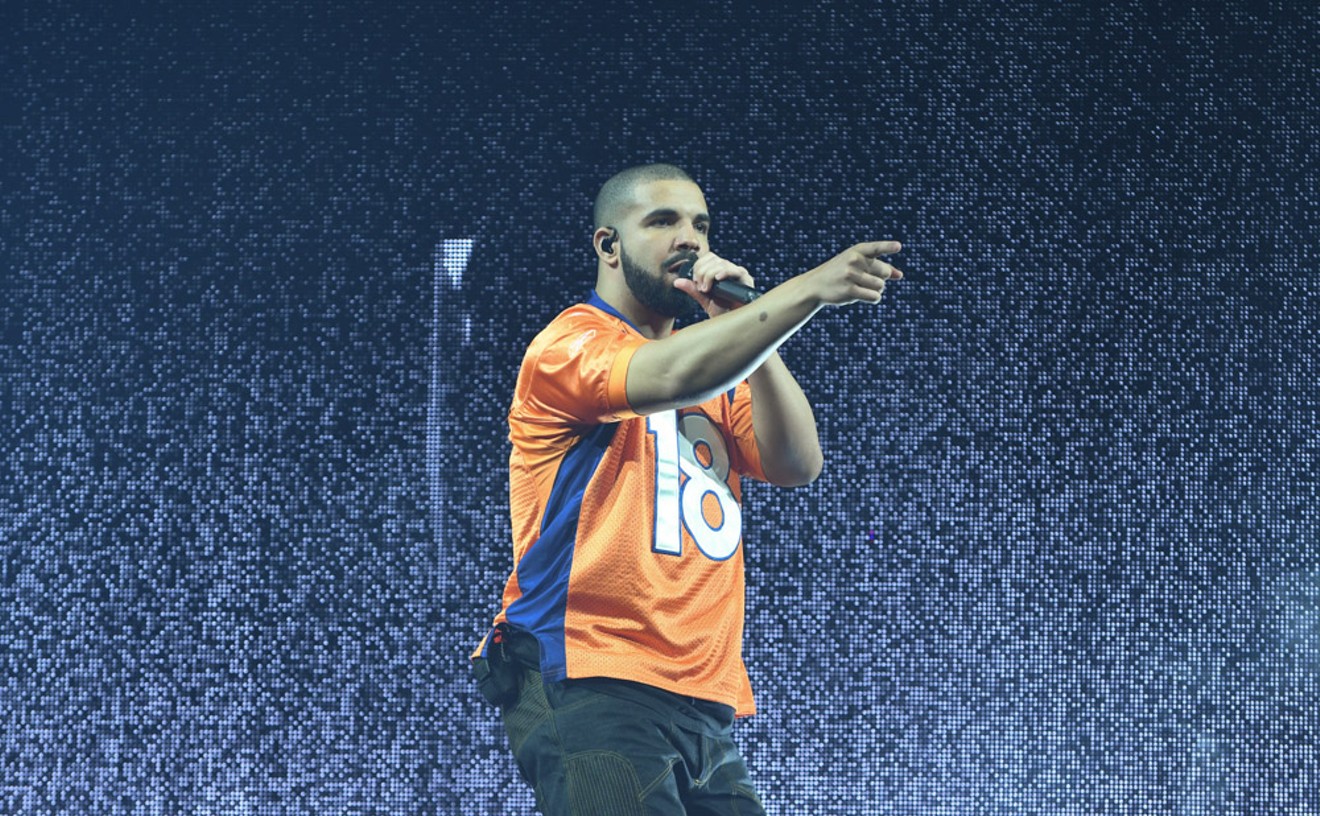Today he's rubbing shoulders with Nobel Peace Prize winners -- "the Nobels," he and partner Dawn Engle call them. As in, "The Nobels told us to go shopping," Engle confides, sitting on the patio of the historic bungalow that holds both the pair's studio apartment and the world headquarters of PeaceJam.
The Nobels don't usually concern themselves with activities as mundane as shopping. In fact, Jody Williams, the 1997 Nobel Peace Prize winner, told Suvanjieff that American kids will someday realize that "shopping is not a right." Suvanjieff knows that, of course. When Archbishop Desmond Tutu, the 1984 Nobel Peace Prize winner, was about to marry the couple in 2001, he spotted the unusually tidy Suvanjieff and said, "Oh, man! You bathed!"
But now the Nobels wanted them to go shopping, and so last Saturday, Suvanjieff -- who generally wears jeans, T-shirts and a motorcycle jacket, where he stashes his ubiquitous pack of Marlboro Lights -- went to Foley's and bought a sharkskin suit. He'd thought about a zoot suit from Suavecito, some classic Western-wear from Rockmount -- something that would represent Denver -- but when you've been called to Rome for the sixth World Summit of Nobel Peace Laureates, hosted by the Gorbachev Foundation, to pick up the "Man for Peace" prize, nihilist sharkskin seems right.
"As the traditional 'Man for Peace' prize is awarded every year to celebrities from the world of music and showbiz who have contributed in an outstanding way with their own image to support social, humanitarian and peace initiatives," the congratulations letter from the Gorbachev Foundation announces, "starting this year our Committee has decided to establish a special 'Man for Peace' Award dedicated to honoring the memory of such a splendid person and extraordinary champion of peace as Prof. Roblat."
That would be the late Sir Joseph Roblat, a scientist who worked with Marie Curie, was instrumental in the Manhattan Project, quit the project in 1944 as "the first anti-nuke protester," Suvanjieff says, and won the Nobel Peace Prize in 1995 -- fifty years after the United States dropped an atomic bomb on Hiroshima. "For a number of years, we didn't even try to meet him," says Engle. "We thought he wouldn't care about us. But he instantly got PeaceJam." He not only got it, but he nominated Suvanjieff and Engle for the Man of Peace award, saying they'd found "the perfect formula for peace education."
"It's our first international award," Suvanjieff says of the November 24 honor. "And the international recognition will make PeaceJam more visible in European communities."
They won't have much time to savor the attention, though. They have a dozen PeaceJam conferences to organize for next year, including one in England in March that they're doing with Roblat's foundation. And next September, to mark PeaceJam's tenth anniversary, they're hosting a three-day global dialogue at the University of Denver, which will feature fourteen Nobel Peace Prize winners and thousands of young people from around the globe. "When we first started," Engle says, "we didn't know if we'd even have a ten-year anniversary."
That they started at all is just as amazing. "I got here Labor Day 1985," remembers Suvanjieff, a blue-collar kid from Detroit. "Everything was going downhill because of the oil bust." An artist and musician -- a member of the legendary Ramrods, he's already thinking about what bands might serenade the Nobels -- he worked at Cliff Young's restaurant for a half-dozen years, with a brief time-out for that gig as the Rocky Mountain News's society writer. Suvanjieff was fired three days before his probation period ended, "and the next week," he says, "I was parking cars at Cliff Young's for the same people I wrote about the week before."
Suvanjieff was living in a true northwest Denver loft -- $500 a month, no heat, asbestos hanging from the ceiling -- during the summer of '93, the Summer of Violence, when he started chatting with a couple of neighborhood kids who were dealing drugs. "You have to be pretty smart to run a business," he told them. "Who's the president of the United States?" None of them knew. Suvanjieff kept talking, going on -- he does go on -- about apartheid, and discovered that while these kids didn't know the U.S. president, they knew all about Desmond Tutu and Nelson Mandela.
He and Engle were working on an Allen Ginsberg project at Naropa at the time, she recalls, and Suvanjieff "came up to Boulder the next day, and he was on fire: 'Nobel Laureates, they're the ones who can speak to these kids.'"
Engle mentioned that she knew the Dalai Lama, winner of the 1989 Nobel Peace Prize. "And I said, 'Bullshit. No person from Detroit knows the Dalai Lama,'" Suvanjieff remembers. But Engle did: She'd met him when she was working as a congressional aide and doing volunteer work for the Free Tibet campaign. Somehow she managed to wrangle an audience with the Dalai Lama. Even more miraculously, the pair came up with the cash for plane tickets to India. "We took that meeting," Suvanjieff says. "The Dalai Lama was great. He looked me in the eyes and said,'You're not Buddhist, are you? At least you're not crazy.'" The Dalai Lama told them that he'd like to help inspire a new generation of peacemakers, but that they would also need to sign up other Nobels, like Desmond Tutu and Oscar Arias, the 1987 prize winner. Engle and Suvanjieff were jamming -- PeaceJamming -- but soon realized they'd forgotten to ask for contact information.
So back in that unheated loft, wearing coats and long underwear, they dialed Capetown information. They finally reached Tutu, who invited them to South Africa. They scrounged up more airfare and kept calling. "We had no idea how impossible this was," Engle says. "This is the only organization in the whole world where the Nobel Laureates work together. We didn't know it. When we approached them about working with youth, they all said they'd wanted to. They're now our board of directors."
The first PeaceJam event was held in March 1996 at Regis College, then PeaceJam's home base. Betty Williams, who shared the 1976 Nobel Peace Price with Mairead Corrigan Maguire, offered the keynote address. Since that initial gathering, there have been 102 more PeaceJam conferences, during which over 250,000 teenagers have learned about, and from, a dozen Nobel Prize winners. The Nobels have partied in that northwest Denver loft, and on the back patio of the Arvada house -- home of the town's first mayor -- where PeaceJam moved a few years ago. (The loft has since been subdivided into five pricey "lofts.") And they've all signed a commemorative snowboard for Suvanjieff: "You're actually a nice guy," wrote Tutu.
The actually nice guy and Engle are heading to Houston this weekend for the 104th PeaceJam conference, which features Adolfo Perez Esquivel, the 1980 Nobel Peace Prize winner from Argentina. After that conference, just as after all the other PeaceJam conferences, young participants will return home and work for change in their communities. PeaceJam vets have gone on to create teen centers, violence-prevention programs and AIDS-prevention projects, and have even run the PeaceJam office. That's where Jes Ward, "Jes the Jedi," rides herd on a staff of nine -- ten years after she attended her first PeaceJam conference as a troubled fourteen-year-old and listened to Desmond Tutu. "He spoke to us from the heart and addressed us as those who held the future in our hands," she remembers.
Ten months from now, the future arrives in Denver, when the tenth-anniversary party for PeaceJam -- slated to be broadcast around the world -- kicks off a ten-year campaign for global peace. "It's the largest gathering of Nobel Peace Laureates in the USA ever -- and for our little educational group in Denver," Engle says. "Both Ivan and I are from very poor families; we're factory-worker kids. That somehow we wound up in the role of putting this together is crazy. The most exciting thing to teenagers is you don't have to be perfect to do something good."
"We're completely flawed people," Suvanjieff says. "If someone doesn't think God has a sense of humor, I cite our case."











